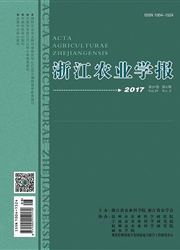

 中文摘要:
中文摘要:
研究枸杞多糖(LBP)对四氯化碳诱导建鲤肝组织急性损伤的保护作用。将建鲤随机分为6个组,即空白对照组(CK)、模型组(CCl4)、枸杞多糖药物对照组(LBP CK)、处理组(LBP 0.1 g·kg-1、0.5 g·kg-1、1.0g·kg-1),连续饲喂60 d后,模型组及处理组按体重0.05 m L·10g-1体内注射30%CCl4-植物油混合液,72 h后收集肝组织及血液,检测谷丙转氨酶(GPT)、谷草转氨酶(GOT)、乳酸脱氢酶(LDH)、超氧化物歧化酶(SOD)、丙二醛(MDA)、总蛋白(TP)、白蛋白(Alb)、过氧化氢酶(CAT)、谷胱甘肽过氧化物酶(GSH-Px)、谷胱甘肽(GSH)、总抗氧化能力(T-AOC)等一系列生化指标。研究结果表明:腹腔注射30%CCl4-植物油可诱导建鲤急性肝组织损伤。1.0 g·kg-1的枸杞多糖能有效降低建鲤血清中GPT、GOT、LDH活性及肝组织中MDA含量,显著提高肝组织中T-AOC、CAT、GSH-PX、SOD、GSH及TP含量(P〈0.05);0.5 g·kg-1枸杞多糖对血清中GPT的降低及肝组织中SOD、T-AOC和Alb的提高均有显著作用(P〈0.05);0.1 g·kg-1枸杞多糖对血清及肝组织中生化指标无显著效果。综上结果,认为枸杞多糖对四氯化碳致建鲤肝损伤具有一定保护作用,可以应用于鱼类肝损伤的防治。
 英文摘要:
英文摘要:
The aiming of this study was evaluating if the Chinese herbal medicine Lycium barbarum polysaccharides had hepatoprotective effects against CC14-induced liver accurate injury in Cyprinnus var. Jian. The carps were ran- domly divided into 6 treatment groups, which named blank the control group ( Ctrl), model group ( CC14 ), Lycium barbarum polysaccharides drug the control group ( LBP Ctrl), experimental group ( LBP 0. 1 g. kg- 1,0. 5 g. kg- 1, 1.0 g. kg - 1 ). After fed for 60 days, the model group and Lycium barbarum polysaccharides drug control group were injected ( i. p) with 30% (V/V) of CC14 in arachis oil at a volume of 0. 05mL 10g-1 of body weight, after 72 h , the liver samples and blood were collected for detccting glutamic pyruvic transaminase ( GPT) , glutamate oxalate transaminase (GOT) , lactatedehydrogenase (LDH) , superoxide dismutase (SOD) , malondialdehyde (MDA) , to- talprotein (TP), lbumin (Mb), catalase (CAT), glutathione peroxidase (GSH-Px), Glutathione (GSH) and total antioxidant capacity (T-AOC). The results showed that CCl4 could indnce the liver injury of Jian Carp; the 1.0 g kg-1 LBP could effectively reduce the value of GPT, GOT, LDH and MDA and improve the value of T-AOC, CAT, GSH-Px, SOD, GSH and TP ( P 〈 0. 05 ) ; 0. 5 g kg-1LBP could effectively reduce the value of GPT and improve the value of T-AOC, SOD. But 0. 1 g-kg- i LBP had no obvious changes on these indexes. From the above results, it can be indicated that LBP had hepatoprotective effects against carbon tertrachloride ( CC14 ) -induced liver accurate injury., and could be used for fish liver disease prevention and control.
 同期刊论文项目
同期刊论文项目
 同项目期刊论文
同项目期刊论文
 Effects of curcumin on antioxidative activities and cytokineproduction in Jian carp (Cyprinus carpio
Effects of curcumin on antioxidative activities and cytokineproduction in Jian carp (Cyprinus carpio Identification and characterization of a LTR retrotransposons from the genome ofCyprinus carpio var.
Identification and characterization of a LTR retrotransposons from the genome ofCyprinus carpio var. A Study of 2,3,7,8-Tetrachlorodibenzo-p-dioxin Induced Liver Injury in Jian Carp (Cyprinus carpio va
A Study of 2,3,7,8-Tetrachlorodibenzo-p-dioxin Induced Liver Injury in Jian Carp (Cyprinus carpio va 期刊信息
期刊信息
